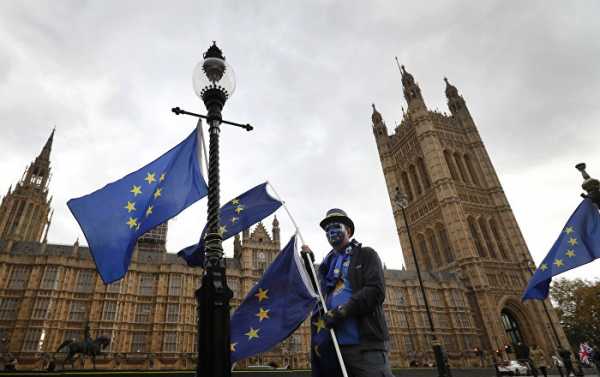
The tumultuous Brexit talks have suppressed the UK’s private sector investment, while the recovery of the pound sterling weighed on exports and manufacturing output – resulting in a slight downgrade of GDP expansion last quarter.
Kristian Rouz – The Office for National Statistics (ONS) revised British GDP growth downward for the past quarter, citing its concerns of a slowdown in production industries. The downgrade is believed to thwart the Bank of England’s (BOE) monetary policy projections for this year, as the interest rate increases planned previously could impair economic growth.
GDP expansion estimates for the October-December 2017 period were revised from 0.5 percent to 0.4 percent quarter-on-quarter, bringing the growth estimate for full-year 2017 down to 1.7 percent from 1.8 percent reported previously.
”A number of very small revisions to mining, energy generation and service were enough to see a slight downward revision to quarterly growth overall,” Darren Morgan of the ONS said.
According to the ONS report, the UK’s economic output turned out to be weaker than initially believed, as a rebound in the sterling’s FX rate held back the British exports and domestic manufacturing, whilst imports gained momentum.
The UK’s services sector, making up some 80 percent of the GDP, rose 0.6 percent during the period due to the ongoing expansion in private-sector and financial services. However, construction plunged 0.7 percent last quarter, while household spending rose just 0.3 percent.
Meanwhile, the UK’s trade deficit widened by £2.5 bln to £12.2 bln during the quarter due to the rise in the cost of imported fuels, stemming from higher oil prices.
The report comes after the BOE’s chief economist Andy Haldane said the central bank could tighten its policy, increasing rates at a quicker pace than previously expected. This as domestic inflation, global growth, and the UK’s economic expansion are set to accelerate this year.
However, how his predictions have been deemed less justified, even though the financial markets have priced in a more aggressive BOE policy path.
“The economy still appears to have gathered a little momentum in the second half of last year,” Samuel Tombs of Pantheon Macroeconomics said. “All told, then, the latest GDP data suggest that the economy remains in a fragile state and does not need to be cooled with another rate raise as soon as May.”
Additionally, a temporary shutdown of the Forties pipeline system for most of December contributed to the slowdown in the UK’s economy. The closure produced some £20 mln in lost output per day – suggesting the macroeconomic fundamentals remain in line with the previous estimates.
Meanwhile, private-sector investment has been stagnant due to the political uncertainty surrounding tumultuous Brexit negotiations. Investors are looking for clarity in terms of post-Brexit relations with the continent to base their business forecasts off.
The modest growth in household spending is explained by the outbreak of inflation last year, while disposable incomes faltered, putting pressure on the consumers.
However, the UK’s labour productivity, which had shown no signs of improvement since 2007, rose a solid 0.8 percent in 4Q17, according to the ONS. This is an encouraging development for private sector enterprises, which could see a boost in output if the productivity trend remains.
Additionally, Q3 productivity ticked up 0.9 percent, resulting in the strongest two-quarter streak of improvement since the economic crisis back in 2008.
UK wages excluding bonuses rose 2.5 percent year-on-year, while unemployment edged up to 4.4 percent.
The BoE expects wage growth to accelerate to 3 percent this year, while inflation is set to slowdown as the costs of imports fall amidst the pound’s recovery. These developments are set to return the UK’s workers to a gradual improvement in living standards.
Sourse: sputniknews.com
0.00 (0%) 0 votes


































